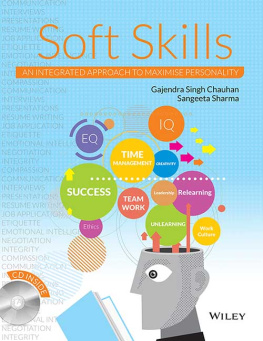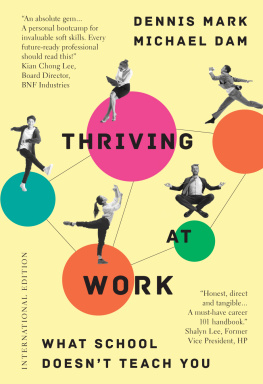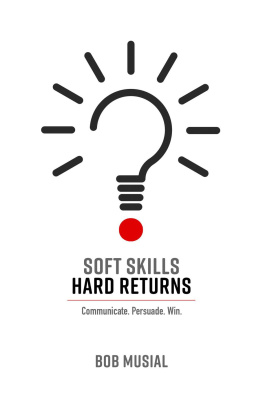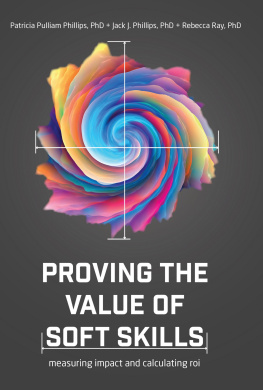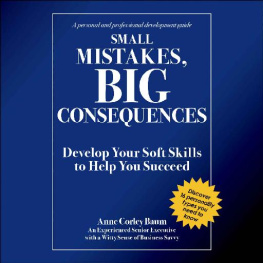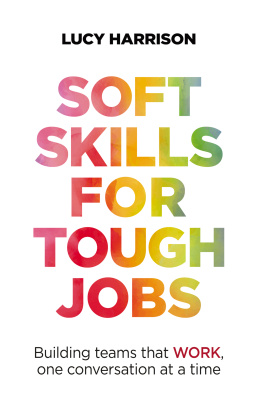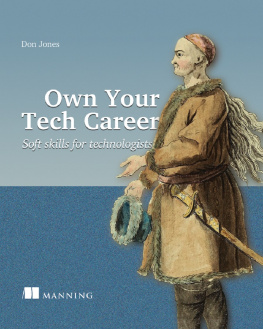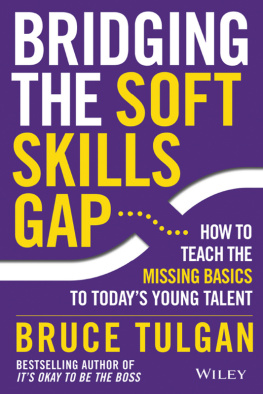Soft Skills
AN INTEGRATED APPROACH TO MAXIMISE PERSONALITY
Soft Skills
AN INTEGRATED APPROACH TO MAXIMISE PERSONALITY
GAJENDRA SINGH CHAUHAN
Head and Associate Professor
Department of Humanities and Social Sciences
BITS Pilani
SANGEETA SHARMA
Associate Professor
Department of Humanities and Social Sciences
BITS Pilani

Soft Skills
AN INTEGRATED APPROACH TO MAXIMISE PERSONALITY
Copyright 2016 by Wiley India Pvt. Ltd., 4435-36/7, Ansari Road, Daryaganj, New Delhi-110002.
Cover Image: exdez/iStockphoto
All rights reserved. No part of this book may be reproduced, stored in a retrieval system, or transmitted in any form or by any means, electronic, mechanical, photocopying, recording or scanning without the written permission of the publisher.
Limits of Liability: While the publisher and the author have used their best efforts in preparing this book, Wiley and the author make no representation or warranties with respect to the accuracy or completeness of the contents of this book, and specifically disclaim any implied warranties of merchantability or fitness for any particular purpose. There are no warranties which extend beyond the descriptions contained in this paragraph. No warranty may be created or extended by sales representatives or written sales materials. The accuracy and completeness of the information provided herein and the opinions stated herein are not guaranteed or warranted to produce any particular results, and the advice and strategies contained herein may not be suitable for every individual. Neither Wiley India nor the author shall be liable for any loss of profit or any other commercial damages, including but not limited to special, incidental, consequential, or other damages.
Disclaimer: The contents of this book have been checked for accuracy. Since deviations cannot be precluded entirely, Wiley or its author cannot guarantee full agreement. As the book is intended for educational purpose, Wiley or its author shall not be responsible for any errors, omissions or damages arising out of the use of the information contained in the book. This publication is designed to provide accurate and authoritative information with regard to the subject matter covered. It is sold on the understanding that the Publisher is not engaged in rendering professional services.
Trademarks: All brand names and product names used in this book are trademarks, registered trademarks, or trade names of their respective holders. Wiley is not associated with any product or vendor mentioned in this book.
Other Wiley Editorial Offices:
John Wiley & Sons, Inc. 111 River Street, Hoboken, NJ 07030, USA
Wiley-VCH Verlag GmbH, Pappellaee 3, D-69469 Weinheim, Germany
John Wiley & Sons Australia Ltd, 42 McDougall Street, Milton, Queensland 4064, Australia
John Wiley & Sons (Asia) Pte Ltd, 1 Fusionopolis Walk #07-01 Solaris, South Tower, Singapore 138628
John Wiley & Sons Canada Ltd, 22 Worcester Road, Etobicoke, Ontario, Canada, M9W 1L1
First Edition: 2016
ISBN: 978-81-265-5639-7
ISBN: 978-81-265-8220-4 (ebk)
www.wileyindia.com
Preface
Presently we have two incredible virtues as a nation: one, the youngest population in the world; and second, the vibrant emerging knowledge economy. To build upon this strength, we need a workforce suitably trained in soft skills. Several researches unequivocally support that people and their skills are very critical in order to sustain or make a business successful. The book is designed with a clear objective to identify the need of the present generation and empower them with the right set of skills to make them employable. Authors feel that there is a distinct mismatch between the expectations of the economy and skills of the graduates, calling for immediate partnership of academia and industry to fill this vacuum of soft skills in young graduates leading to poor employability. As a result, students have good theoretical knowledge, but they lack problem-solving skills due to lack of exposure to practical projects. The good news is that soft skills can be learned and mastered. Therefore, the training of soft skills for prospective professionals is gaining momentum, as 9 in 10 employers believe that graduates with soft skills will become increasingly important as globalisation speeds up, according to a survey by Talent Q, part of Hay Group.
With the bunch of soft skills, the book chips in to fill this void between the university curriculum and current industrial needs. The proposed book intends to work on core skills with practical approach based on authors own academic experience and research with management and engineering graduates, and also forms the backdrop of the book to bring valuable inputs for the overall development of the students. The book includes various stories, illustrations and cases from the real world to prove the argument: how soft skills do wonders when rightly combined with hard skills in life.
Book Sections
The book strategically divides soft skills under three domains: Social, Academic and Professional. Although they are strongly inter-dependent and complementary to each domain, the division makes it easy to represent the different soft skills depending upon their direct source of learning and application to the practical world. explores the skills which are of immediate relevance and utility to the market and enables the graduates to learn these skills along with social and academic skills to build a strong prospect in the competitive job market. These skills prepare the graduates to be good leaders and decision makers, to have critical thinking, to cope with stress, to work as team players and how to learn and unlearn at workplaces.
Snapshots of the Book
Learning Roadmap
These are the lampposts that highlight the key issues covered in the chapter and steer the expected learning outcomes for the students.
Learning Roadmap
After reading this chapter you will be able to:
- Differentiate between soft skills and hard skills.
- Appreciate why soft skills are essential for employability.
- Comprehend the importance of collaboration bridge between the academia and the industry for building knowledge economy.
- Know about the plans of various departments for skill enhancement of their professionals.
- Appreciate the importance of the employability skills in global perspective.
- Know about the roll-out of the new Skilled India programme for better employability and productivity.
Perspectives
These box items feature in-depth discussions of a particular soft skill covered in the chapter and its application and significance in real life.
PERSPECTIVE
We are one of the youngest populations in the world with a huge reservoir of English-speaking youths. Fortunately, to enable this young force to contribute to nation-building, the present government has taken up skill development as a thrust area. Along with Digital India and Make in India, the government has launched a momentous programme called Skill India to overcome the scarcity of skilled manpower. It intends to create more opportunities for skill enhancement of the young Indians and train them to optimise productivity in all sectors. Skill India is a massive movement for young India where the academia and corporates join hands to fill skill gap for better employability. It aims to train the youths in a way that would make them a valuable human resource for the society and the nation. With such skill development initiatives, our young generation can create history by making our nation developed and knowledgeable. Our nation would become a land of opportunity and prosperity if we mould and train our youths to be skilful and tech-savvy. Simply knowing things may not help us. We need to master skills to practise what we have learnt. It is time we realised that college degrees and campus placements are not the ultimate

